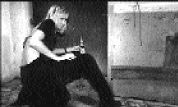SANDRA COLLINS
Showbox, 628-3151 $15 at 10 p.m., $20 after 11 p.m. Sat., Dec. 8
SOME DJS BUILD their reputations on the ability to mix in and out of countless tracks with lightning-fast speed, while others let records play out till almost the last beat. But Sandra Collins, the progressive house and trance jock voted Best Female Artist of 1999 by URB magazine readers, takes a more commonsensical approach. “I always think that there’s a point to the music that I play, and I don’t mix out of [a record] before that point’s been made,” she says from her Florida home.
For a tasty example of what she means, check out CREAM Mixed by Sandra Collins (Kinetic Records), the follow-up to last year’s successful Tranceport Vol. 3. Over the course of 11 cuts (including “Derangement of the Senses” by her boyfriend, Florida producer Voyager), Collins weaves vocal tracks and percussive instrumentals into a compelling, 74-minute program full of shadows and light.
Collins admits the disc was designed with at-home listening in mind rather than trying to re-create one of her club sets. “I went in different directions,” she explains. “I didn’t build and build and build, like on Tranceport. I started off a little more energetic and then went kind of dark and then really pretty. There’s lots of emotions in it.”
The Nevada native’s wide stylistic range behind the decks stems from catholic tastes plus years of experience. When she began mixing in her bedroom back in 1987, she worked with the cutting-edge dance music of that era: acid house, New Beat, industrial, and techno. When she’s off the clock, today her listening diet favors alternative acts like Coldplay, Air, and Mazzy Star (“I want to remix ‘Fade Into You,'” she confesses) or classic ’70s fare by Minnie Ripperton, Heart, and Todd Rundgren.
After cutting her teeth at Arizona raves, Collins relocated to Los Angeles in the early ’90s. There, she rose to prominence at the infamous Sunday after-hours Sketch Pad. “I call it boot camp,” she laughs. “If you can make it through Sketch Pad, you can make it through anything. It was packed full of people who had been going to parties all weekend. Nobody was talking to each other; they were really into the music. It could freak you out a little bit because it was so underground, and the regulars there were very strong-minded.”
Raised in Las Vegas, Collins’ entr饠into show business was inevitable: Her mother was a singer, while her father—who died when she was 5—was a successful comedian. “When I was 17, I visited my godfather, Milton Berle,” she recounts. “We went to the Friars Club, and all these old comedians from the ’50s and ’60s—Ed McMahon, George Burns—all came up to the table: ‘I remember you when you were just a little baby.’ I’m quite silly myself. I get it from my dad.”
Now she’s following in her mom’s footsteps, too, having recently taken up singing lessons. “I’ve wanted to do it my whole life, but I’ve been shy,” she admits. “Everybody’s got a voice. You don’t have to belt it out like Whitney Houston. You can sound like Mazzy Star or Alanis Morrisette, or you can whisper . . . and hopefully you don’t sound horrible. I think I got it to where I can at least sing in some sense.”
But fear not, Collins has no immediate plans to abandon her current career, even if she expresses reservations about it. “I don’t like the traveling. I don’t like having to draw open the hotel curtains to find out where I’m at. But when I’m playing, and I love the song I’m playing, and I see people reacting to it the same way I did when I first heard it, I’m doing my job.”






